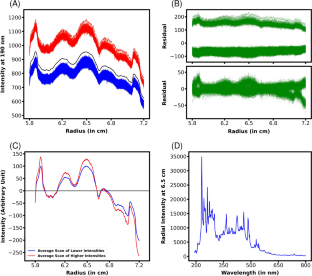Systematic noise removal from analytical ultracentrifugation data with UltraScan
Abstract
A method for removing time- and radially invariant noise from sedimentation velocity and sedimentation equilibrium experiments performed in an analytical ultracentrifuge is presented. The method averages repeat radial incident light measurements as a function of the photomultiplier response at different wavelengths to remove the majority of the time-invariant noise contributions from intensity data measurements. The results of this method are compared to traditional absorbance data generated with a buffer reference and the Beckman Optima AUC data acquisition program, and with the standard UltraScan refinement workflow. The method avoids the amplification of stochastic noise inherent in the absorbance scan subtraction traditionally employed in sedimentation velocity and equilibrium data. In addition, the collection of intensity data frees up the reference channel for additional samples, doubling the capacity of the instrument. In comparison to absorbance data, the residual mean square deviation of a fitted sedimentation velocity experiment without additional noise correction by UltraScan was improved by a factor of 4.5 when using the new method. This improvement benefits sedimentation equilibrium experiments as well as analytical buoyant density equilibrium experiments where routine time-invariant noise correction calculations cannot be performed.


 求助内容:
求助内容: 应助结果提醒方式:
应助结果提醒方式:


